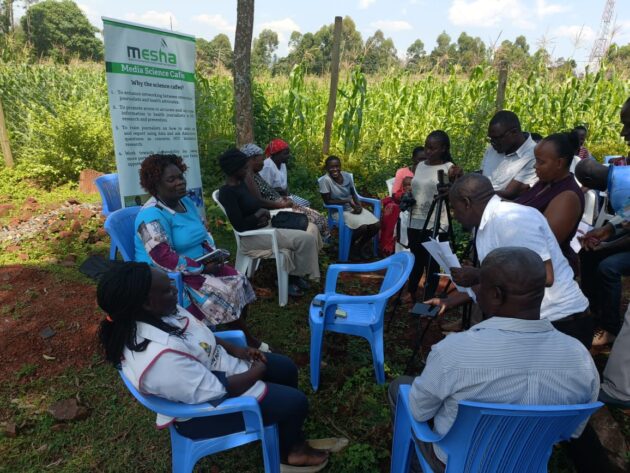
Success of young mothers living with HIV forming table banking group for social economic empowerment » Capital News
KISII, Kenya, Jul 3 – ‘Upendo,’ the Swahili name meaning love is not an ordinary word in Ringa, Kojwach, Homa Bay County.
Upendo is a Women group made up of young mothers living with HIV/AIDS who have come together with a common goal of social economic empowerment.
In this location, young mothers living with HIV/AIDS endured stigma and were isolated by family and friends, others transmitted the virus to their newborn babies unknowably, many of them are house wives and depending for their husbands to get food was difficult.
Imagine taking drugs every day in an empty stomach? this was the norm for these women some even gave up taking ARVs on an empty stomach.
Morine Adhiambo the group chairlady who is a discordant partner (a couple where one is HIV positive while the other is negative ) says with all the challenges they faced as young mothers they decided to social economically empower themselves through Upendo group and ensure all the children born henceforth live negatively.
According to Adhiambo, being a discordant partner since 2014 was not easy, with her husband they visited the hospital for HIV tests and it turned out he was positive while she was negative ,they did several teste and the results were the same.
They were both put on drugs as the husband was given ARVs and her put on PreP, the status never changed but they had to accept their status and put more love to the family.
“We launched the group during Covid-19 times in 2021 with a little number and as at now we have twenty members and many of them have young children, unfortunately we lost one of our member last year,” says Adhiambo.
The family has three children who are living negatively, through the Upendo group they were able to express their strength and fears freely because of the confident they had gained following the psychosocial support during their clinic days.
Upendo Women group has two sittings per week where they discuss economic and social issues, those who face gender based violence are guided and push for justice of these women from the police and the court.
“we started a table banking project where members can save as little as $3 per month and members are able to take loans to start or add stock to their small businesses,” says Adhiambo.
Recently they started a project of buying sheep for members besides loaning them money to improve their businesses.
Elsa Adhiambo discovered she was HIV positive when she was married in 2015,at first she tensed and went through trauma to process the news of her HIV status.
“I shared this with my husband and I accompanied him to the hospital where he also tested positive we were put on ARVs and we have been taking them religiously,” says Athiambo.
Adhiambo joined the Upendo group after she was introduced by a friend, she is able to take care of her young kids through the support of upendo women group.
Karachuonyo level four HIV/AIDS coordinator Leornard Okumu says his major role is to prevent mother to child HIV transmission.
The hospital ensures HIV positive pregnant women adhere to their drugs and after birth, mother and her child religiously take their drugs and monitor tests every after visit to ensure the babies are born negative.
Okumu says the sub-county has achieved the 95% identification,95% tests and 95% treatment with a 94% suppression of the virus.
According to Mother and child unit officer Caro Atieno, hospital delivery has reduced cases of mother child HIV transmission with mothers.
Lameck Okumu a clinitian at Rachuonyo level four hospital says they ensure that the initial HIV-positive result is confirmed with a second, different test to rule out false positives. Take a detailed medical history, including risk factors for HIV, past health issues, and any current symptoms.
They also provide psychosocial support and address stigma associated with HIV and reassure the patient that HIV is a manageable condition with proper treatment and transmission prevention.
“The hospital provides Coordinate care with other healthcare providers, including primary care physicians, mental health professionals, and social workers, to provide holistic care,” says Okumu
Homa Bay County HIV/AIDS research information and new learning unit-Justus Ochola says Rachuonyo East hospital has recorded a reduction of new HIV infections among children in the recent past to 2.5% from 5.3% in 2012.
Pregnant women must undergo HIV tests and those who turn positive are immediately put under ARVs medication ,they are monitored and when children are born, they are also put under drugs and get regular tests till grow out of the risk age bracket of mother child transmission.
The hospital has advocated for safe sex such as use of ARVs, PreP, family planning, reduced number of sex partners, regular HIV tests and women delivering from hospitals.
“The community has recorded 78% women delivering their babies from hospitals from 48% an improvement in the antenatal clinic,” said Ochola.
Adolescents and young people aged 10-24 years in Kenya constitute 16 million people, accounting for 34% of the total population (KNBS 2019 population census). Kenya is not on course to achieve the targets set for ending AIDS among adolescents and young people as a public health threat by 2030.
In 2022, an estimated 1,215 AIDS-related deaths occurred among adolescents aged 10-19. More than half (59%) of the new HIV infections in Kenya occurred among adolescents aged 10-19 in 2022 were in 10 counties.
